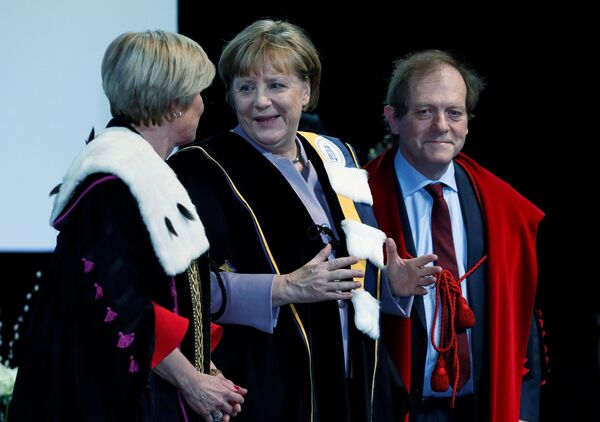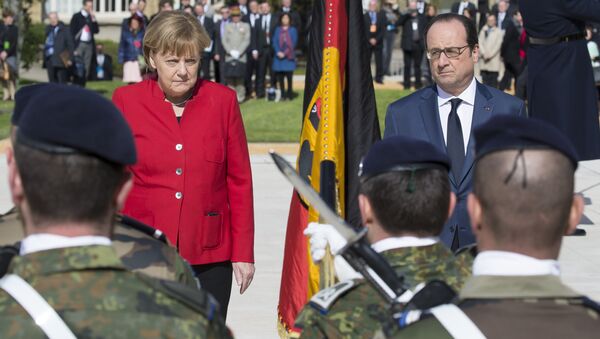Speaking to the press in Brussels as she received an honorary joint doctorate from Ghent and Louvain universities, Merkel said "traditional partners" could no longer be relied upon to "closely cooperate" with Europe on issues such as defense. Moreover, Merkel said to do so would be "naive" at a time when the continent was facing its "biggest challenges" in decades.

Merkel also urged EU Member States to a unified front in impending Brexit negotiations with the UK, with the event bringing into sharp focus the importance of maintaining and increasing solidarity with the EU. The UK's secession should, she said, be considered "an incentive to work together," in order to hold Europe together, "improve it further" and bring its citizens "closer together again".
"The 27 [member states] must act together in negotiations, but first we await the answer about how Britain wants to design its exit," Merkel said.
Andrea Frontini, policy analyst at European Policy Centre, said Brexit and the incoming Trump administration had made the need for European strategic autonomy in security and defense matters "more and more compelling."
"Against this background, recent initiatives by EU institutions — starting with the EU Global Strategy and the Implementation Plan in Defense and Security — and Member States all seem to go in the direction of a pragmatic empowerment of the EU Common Security and Defense Policy. Yet, the ultimate outcome of such a process still remains unclear," Mr. Frontini told Sputnik.
Another perfect storm for EU defence – but can the Union really make strength?
— EuropeanPolicyCentre (@epc_eu) November 25, 2016
Read @AndFrontini commentary here: https://t.co/AraRViSNiT pic.twitter.com/ZJICYdPnt7
Frontini explains this lack of clarity stems from persisting gaps in strategic perceptions among Member States, disagreements on financial burden-sharing, different views on the architecture of military cooperation, including on relations between the EU and NATO, and differing interests in industrial matters.
"As such, it is reasonable to expect a progressively stronger political attention — and further, concrete policy measures — being devoted to enhancing military cooperation across Europe, including a better use of EU instruments and frameworks. Whether this will suffice to make the EU a fully-fledged, effective and visible player in this key area, is still hard to say," he added.
James Flint, doctoral researcher in International Relations at the University of Plymouth, said EU security and defense integration were obviously enhancing, but they lag "far behind" both NATO and the US-UK 'special relationship' in terms of capacity.
"Europe can rely on NATO as far as Europe is committed to and resources NATO — Trump's statements would be less worrisome were European NATO states to up their defense spending."
"Whether EU defense integration is a threat to NATO is another question, and the answer is it is not. However, that doesn't necessarily mean it complements NATO. Both structures are essentially what the member states choose to make of them — but, not all member states are equal," Mr. Flint told Sputnik.
#Trump should demonstrate he is "committed to a strong & credible NATO…that is prepared to defend all its members" https://t.co/N2PBX5wPpl pic.twitter.com/YTiXseFRWI
— NATOSource (@NATOSource) January 11, 2017
Trump is not alone in calling for the US to withdraw from NATO. Major International Relations scholars such as Barry Posen, Andrew Bacevich, Stephen Walt and John Mearsheimer all called for the US to hand NATO over totally to the European Union in 2016.


